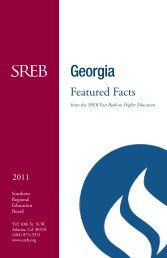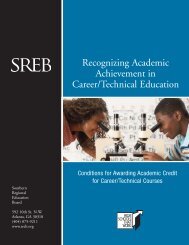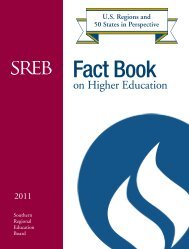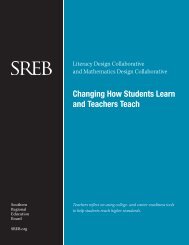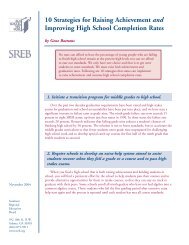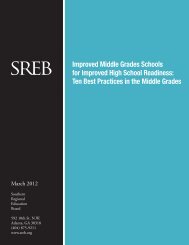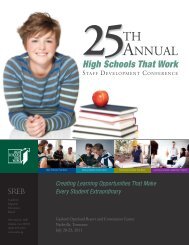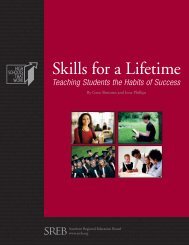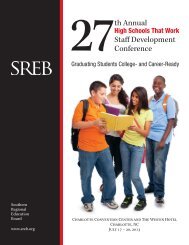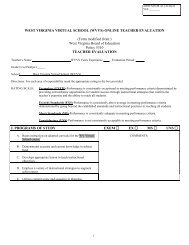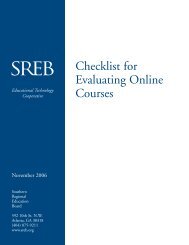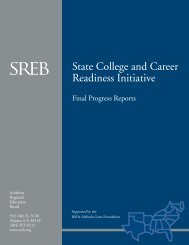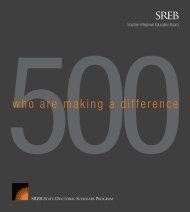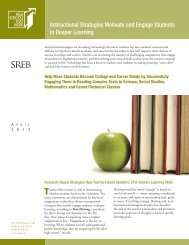2012-2013 National Professional Development Programs
2012-2013 National Professional Development Programs
2012-2013 National Professional Development Programs
Create successful ePaper yourself
Turn your PDF publications into a flip-book with our unique Google optimized e-Paper software.
High-Quality Career/Technical Instruction for the 21st CenturyJANUARY 28 – 29, <strong>2013</strong>, GREENVILLE, SCREGISTRATION FEE: $300 PER PERSONThis workshop is cosponsored by the <strong>National</strong> Research Centerfor Career and Technical Education (NRCCTE) and SREB/HSTW.WHO SHOULD ATTENDState and district professional development directors, district and school leadershipteams, instructional leaders, teacher-leaders, and CT department heads. Participants areencouraged to bring a laptop computer or portable electronic device.WHY YOU SHOULD PARTICIPATELearn how to increase the quality of instruction in your CT programs through professionaldevelopment in classroom planning, assessment, and integration of literacy and numeracyinto instruction in ways that will boost student achievement. CT teachers will receive moreideas on how to actively engage students, manage the classroom and motivate students towork hard.This workshop will target the unique challenge facing CT teachers in the 21st-century— to engage increasingly diverse student populations in learning the technical, academic,and 21st-century knowledge and skills necessary for success in further learning and theworkplace.The workshop is designed around a research-based professional development model forCT teachers sponsored by the NRCCTE (funded through the Office of Vocational andAdult Education and U.S. Department of Education*) and developed in collaborationwith SREB. The strands of the workshop focus on essential instructional skills for CTteachers: standards-based instructional planning, the use of research-based instructionalstrategies, a comprehensive approach to assessment, and a classroom managementapproach that creates a climate of personalization and support. Participants will examinethe significance of each of these instructional skills, distinguish them from the skills oftraditional CT classrooms and develop a plan to increase teachers’ capacity in these areas.A follow-up Webinar series will be provided to support school teams as they undertakeimprovements to their current program offerings.WORKSHOP OBJECTIVES• Create short- and long-term instructional plans based on the varying learning needsof students.• Actively engage students through instructional strategies that encourage thedevelopment of problem-solving, critical-thinking and teamwork skills.• Design formal and informal assessment strategies to evaluate student progress towardlearning goals, provide feedback to improve student leaning, and inform changes toimprove instruction.• Create a classroom and lab environment that encourages motivation, positive behaviorand collaboration among learners.• Reflect, individually and collaboratively, on the effects of instruction and use thereflective process to continually improve instructional practice.WORKSHOP STRANDSSTRAND 1: Instructional PlanningThis strand will provide a strong rationale for instructional planning and introduceparticipants to four essential planning tools — curriculum maps, course syllabi, unit plansand lessons plans — specifically designed for CT courses. To design instructional plansthat result in students being well prepared for further learning and the workplace, theworkshop will explain how to consider both CT subject matter and the needs and concernsof students.STRAND 2: Research-Based Instructional StrategiesThis strand will help participants develop a clear understanding of what it means to activelyengage students in instruction that is intellectually challenging. The focus will be on avariety of instructional strategies to encourage students’ development of critical-thinking,problem-solving, academic and technical skills. Project-based learning, cooperative learning,and the integration of academic and technical content are the three strategies emphasized inthe workshop.STRAND 3: Classroom AssessmentThis strand is designed to help participants develop a clear understanding of the definitionof assessment and how teachers use assessment to improve student motivation, studentlearning and the quality of instruction. Participants will discuss the difference betweenformative and summative assessment, types of assessment tools, and characteristics ofhigh-quality assessment. Teachers will learn how to develop assessment tools and analyzeways to record assessment data and determine a course grade.8



